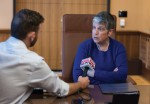What do the chancellor of a university, a retired U.S. senator, a director at Facebook, three members of the press and the University of California president all have in common?
They are all members of the UC’s newly formed Justice League for free speech.
If only these fine individuals were going to do more than write reports and preach to us from across the country.
The UC Office of the President announced late in October that it will establish a new free speech center – the National Center for Free Speech and Civic Engagement – in its Washington, D.C., location. UC President Janet Napolitano said in a letter that the center will focus on research and advocacy of First Amendment issues, and she spoke of how the UC is uniquely suited to tackle the challenging issue of protecting free speech on college campuses.
The Center is chaired by Napolitano, and its advisory board members include UC Irvine Chancellor Howard Gillman, UC Berkeley School of Law Dean Erwin Chemerinsky, New York Times columnist Bret Stephens, former U.S. Sen. Barbara Boxer and UCLA School of Law student Avi Oved.
Of course, if this pseudo-think tank’s goals sound too good to be true, that’s because they are. The Center’s primary functions, as of now, are little more than developing a national conference and offering a fellowship program to scholars and journalists – both of which are mostly being done by busy people, some of whom are on the other end of the country.
If the UC wants to do more than push sound bites and preach from its high horse, it needs to localize the Center’s operations to its campuses. It can do so by hiring administrative liaisons for each campus to work with the Center’s fellows and scholars to advise administrators in real time about how to handle First Amendment issues on campus.
To be fair, the UC hasn’t released all the details surrounding the free speech center’s operations. For example, UCOP spokesperson Stephanie Beechem said the UC will disclose more details about the Center’s fellowship program once applications open up Nov. 9.
However, the most notable connection the Center’s members have with the UC campuses is its fellowship program, which is geared toward public policy experts, legal scholars, social scientists and journalists – not the kind of people you would expect to spend copious amounts of time with students or administrators.
In fact, the fellowship program isn’t much more than a research opportunity that allows people to beef up their resumes. Beechem said the fellowship program pays fellows to conduct research, offer seminars and mentor UC students. She added the Center allows fellows to spend a week at one of the 10 UC campuses to engage with students, faculty, administrators and community members on the subjects of their research.
But these are some things the UC campuses already do. UCLA, for instance, held a weeklong Free Speech 101 event earlier this quarter, where administrators, esteemed law school faculty and members of the media spoke about First Amendment topics such as journalism, civil discourse and free speech on college campuses.
And yet, UC campuses are still embroiled in free speech issues that have notable financial ramifications. In October, the UCLA administration was caught up in a contest of free speech when Bruin Republicans, a conservative campus political group, argued the university was violating the U.S. Constitution by charging the group basic security costs for its Ben Shapiro event scheduled for later this month.
[Editorial: Student groups should pay for basic, warranted security costs]
There’s also the drama that took place at UC Berkeley earlier this year, when the Berkeley Patriot campus group invited a slew of provocateurs such as Milo Yiannopoulos, Steve Bannon and Ann Coulter to speak and argued the university should have subsidized the cost of staffing and reservation fees for its event.
In both instances, the university administration decided to spend thousands, if not hundreds of thousands, of dollars to provide security for these events – but that brings questions such as whether free speech on campus should come at the cost of excessive student fees. Moreover, these events either faced or are bound to face student protests – a lawful form of expression – that also draw into question the UC’s role in protecting First Amendment rights while keeping students’ interests in mind.
This is where the free speech center can come in. The Center could designate representatives who would work closely with scholars and UC administrators to guide the campuses on how to approach their year-round free speech issues. Doing so would help the Center not only serve out its role as a UC entity, but also fulfill its goal of moving past idealistic sound bites.
Sure, the Center offers fellows a one-week stay at a UC campus, but it’s hard to argue seven days is enough time to address First Amendment issues on campus – especially when, as Napolitano said in her letter, the landscape for free speech and how it is interpreted in today’s day and age continues to change.
And while the Center may produce academic works about how universities should approach free speech, university administrators don’t have the time to wait for these publications to come out, let alone read them. Free speech issues are in the here and now, and the Center should reflect that, not leave First Amendment issues to whims of researchers and their fickle timetables.
The National Center for Free Speech and Civic Engagement has the potential to be a shaping institution for the UC. Right now, though, it’s little more than a resume-padding publicity stunt.
